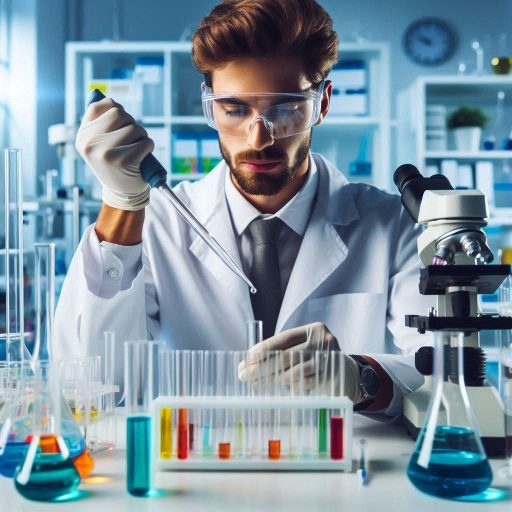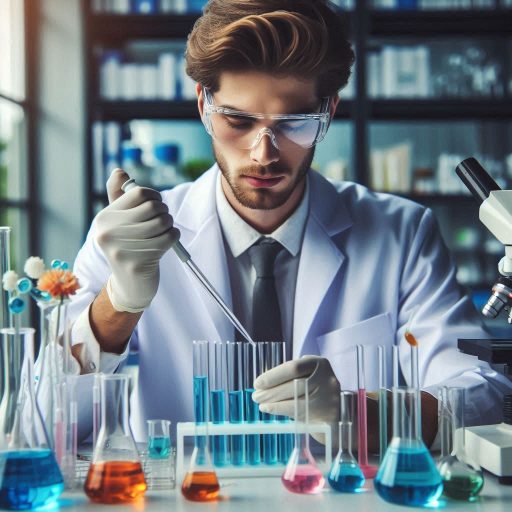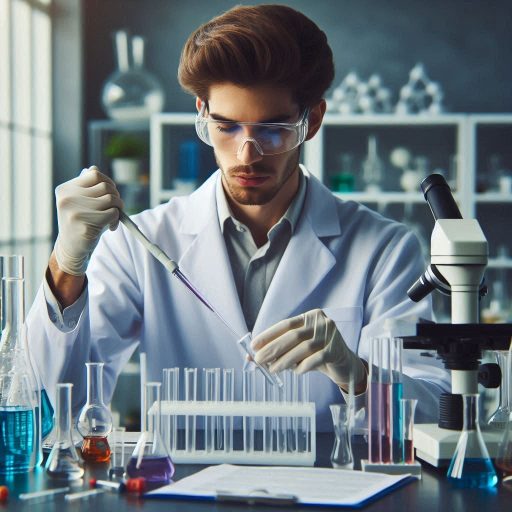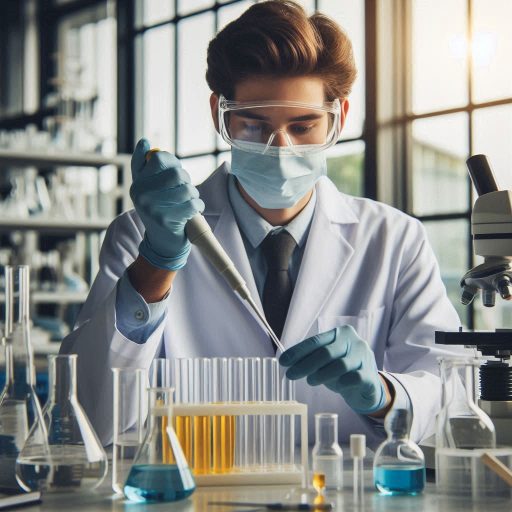Introduction
Lab technicians play a crucial role in advancing medical research.
Their work ensures the accuracy and reliability of experimental results.
These professionals handle complex tasks that are essential for research progress.
Without their support, many scientific breakthroughs would be impossible.
Lab technicians provide the technical expertise needed for innovative studies.
They manage and operate sophisticated equipment, perform critical tests, and maintain meticulous records.
Their skills are indispensable in both academic and clinical research settings.
Brief Overview of the Importance of Lab Technicians in Medical Research
Lab technicians are the backbone of medical research laboratories.
They ensure that experiments are conducted correctly and that results are valid.
Their work includes preparing samples, conducting tests, and analyzing data.
They also calibrate and maintain laboratory instruments to ensure accuracy.
By managing these technical aspects, they allow researchers to focus on scientific inquiries and hypotheses.
Technicians also handle safety protocols, which is crucial in preventing contamination and ensuring a safe working environment.
Their meticulous attention to detail helps in achieving reliable and reproducible research outcomes.
Explanation of How Lab Technicians Support Medical Research
Lab technicians support medical research in several key ways.
First, they prepare and process samples, which is critical for obtaining accurate data.
They handle various types of samples, including blood, tissue, and genetic material.
This preparation involves precise techniques to ensure sample integrity.
Technicians also operate and maintain specialized laboratory equipment.
Their expertise ensures that equipment functions correctly, which is vital for obtaining valid results.
Moreover, lab technicians conduct routine tests and experiments according to established protocols.
They follow strict procedures to minimize errors and contamination.
This adherence to protocols helps in producing consistent and reliable data.
Technicians are also responsible for analyzing test results and recording findings.
Their detailed documentation is essential for tracking research progress and validating outcomes.
In summary, lab technicians are vital to the success of medical research.
Their technical skills, attention to detail, and problem-solving abilities support researchers in their quest for new discoveries.
By ensuring the accuracy and reliability of laboratory processes, they contribute significantly to advancing medical science and improving patient care.
Role of Lab Technicians in Sample Collection
Lab technicians play a vital role in medical research through sample collection.
They ensure that specimens are gathered accurately and consistently.
This process is crucial as it directly impacts the quality of research outcomes.
Lab technicians use various methods to collect samples, each suited to different types of studies.
Proper sample collection techniques help avoid contamination and ensure reliable results.
Their meticulous work supports the integrity of research data and advances scientific knowledge.
Different Methods Used for Collecting Samples
Lab technicians employ several methods for sample collection, depending on the research needs.
Blood samples might be drawn using venipuncture or fingerstick methods.
For urine samples, technicians ensure proper collection containers are used to avoid contamination.
Tissue samples are collected through biopsies or surgical procedures, requiring precise techniques to maintain sample integrity.
Saliva samples might be collected using swabs or collection tubes.
Each method is selected based on the type of study and the nature of the specimen.
Importance of Proper Sample Collection for Accurate Research Results
Accurate sample collection is essential for reliable research outcomes.
If samples are not collected correctly, the results can be skewed, leading to false conclusions.
Contaminated or improperly handled samples can compromise the entire study.
Lab technicians follow strict protocols to ensure samples are collected and stored under optimal conditions.
They verify that all tools and containers are sterile and properly labeled.
This diligence ensures that the research data is valid and reproducible.
Proper collection and handling ultimately enhance the quality and credibility of medical research findings.
Read: Field vs. Office Work in Surveying and Mapping
Conducting various tests and experiments
- One of the key roles of lab technicians in supporting medical research is conducting a wide range of tests and experiments.
- Lab technicians are responsible for performing different types of tests, such as blood tests, urine analysis, and genetic testing.
- These tests help medical researchers gather important data and information to better understand diseases and develop treatments.
- Lab technicians follow strict protocols and procedures to ensure the accuracy and reliability of test results.
- By adhering to these protocols, lab technicians minimize the risk of errors and ensure the validity of research findings.
- Following standardized procedures also helps in maintaining consistency in test results, making it easier to compare data across different studies.
- Accuracy is crucial in medical research, as even minor errors in test results can lead to incorrect conclusions and potentially harmful treatments.
- Lab technicians play a vital role in validating research findings by ensuring that tests are conducted accurately and reliably.
The different types of tests conducted by lab technicians
- Blood tests: Lab technicians collect blood samples and analyze them to assess various aspects of a patient’s health, such as blood cell count and cholesterol levels.
- Urine analysis: Lab technicians examine urine samples to detect the presence of certain substances or indicators of diseases like diabetes or kidney problems.
- Genetic testing: Lab technicians analyze DNA samples to identify genetic mutations or markers that may be linked to specific diseases or conditions.
- Microbiological tests: Lab technicians study microorganisms like bacteria and viruses to understand how they cause infections and develop treatments to combat them.
- Chemical analysis: Lab technicians use techniques like chromatography and spectrophotometry to analyze the chemical composition of substances for research purposes.
Importance of following protocols and procedures for accurate results
- Following protocols and procedures is essential to ensure the reliability and reproducibility of test results in medical research.
- Protocols help standardize the methods used in experiments, making it easier to replicate studies and validate research findings.
- By following established procedures, lab technicians can minimize the risk of human error and maintain the integrity of research data.
- Standardized protocols also facilitate collaboration between different research groups and institutions by ensuring consistency in experimental methods.
- Adherence to protocols and procedures is crucial in maintaining the credibility and trustworthiness of research findings in the scientific community.
- A systematic approach to conducting tests not only improves the quality of results but also enhances the overall efficiency of medical research.
- Lab technicians play a key role in upholding the standards of scientific integrity by following protocols and ensuring the accuracy of test results.
Read: Importance of Accuracy in Surveying and Mapping
Maintaining Lab Equipment and Ensuring Its Proper Functionality
Maintaining lab equipment is crucial for accurate test results.
Lab technicians understand that any malfunction in equipment can lead to incorrect data.
These inaccuracies can significantly impact the outcomes of medical research.
For this reason, lab technicians must ensure that all equipment operates at peak efficiency.
They regularly inspect, clean, and calibrate each machine to prevent errors.
By doing so, they help maintain the integrity of the research process.
Importance of Maintaining Lab Equipment for Accurate Test Results
The importance of maintaining lab equipment cannot be overstated.
Precise measurements are fundamental to medical research, and this precision depends on well-maintained equipment.
A small deviation in readings due to faulty equipment can result in misleading conclusions.
Lab technicians play a key role in preventing these issues by keeping the equipment in optimal condition.
Regular maintenance routines, such as calibration and cleaning, ensure that every machine performs correctly.
This ongoing care guarantees that the data collected is reliable and accurate.
Role of Lab Technicians in Troubleshooting Equipment Issues
Lab technicians also play a vital role in troubleshooting equipment issues.
Despite regular maintenance, machines can sometimes malfunction.
When this happens, lab technicians must act quickly to identify and fix the problem.
Their expertise allows them to diagnose issues efficiently, minimizing downtime and preventing delays in research.
By addressing equipment malfunctions promptly, they ensure that research continues smoothly.
This proactive approach not only saves time but also preserves the accuracy of ongoing experiments.
Lab technicians’ ability to troubleshoot effectively is essential for maintaining the overall functionality of the laboratory.
Read: Surveying and Mapping Technician: Job Satisfaction
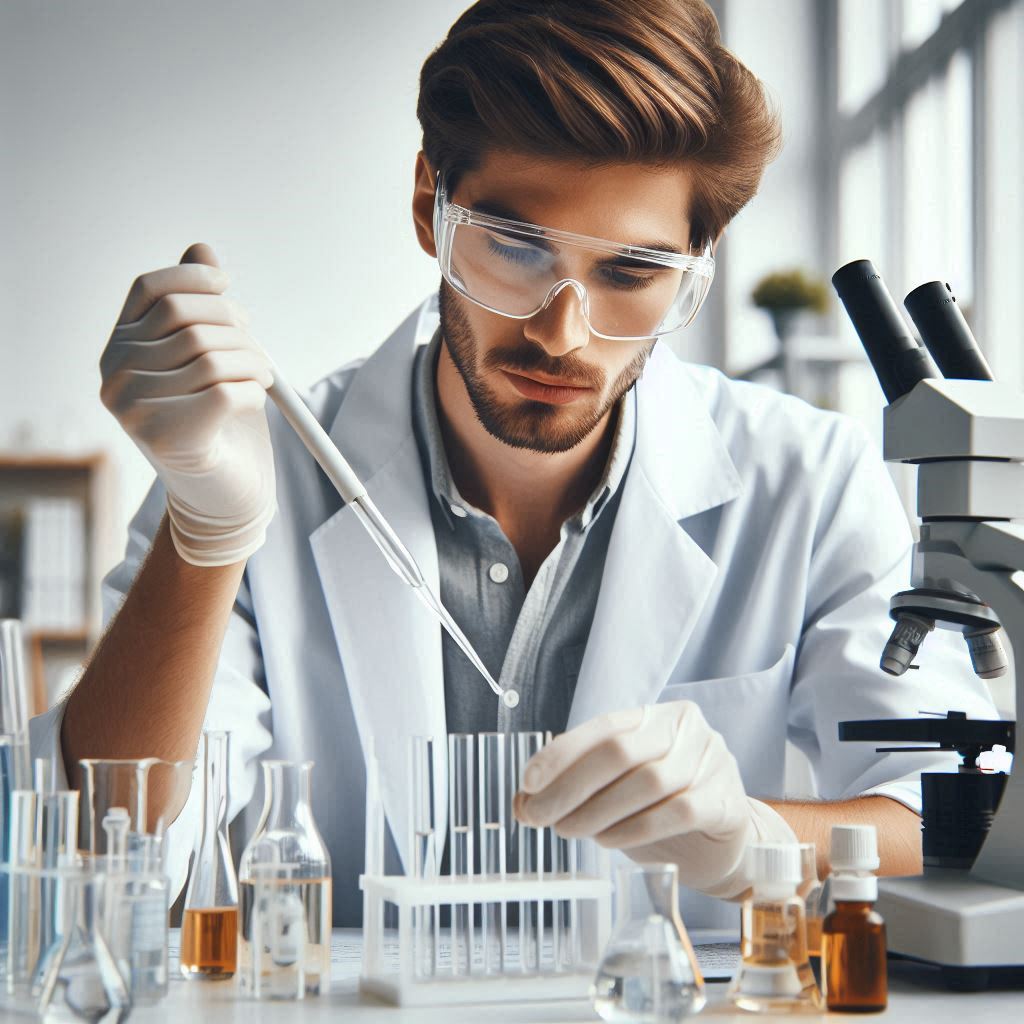
Record-keeping and data analysis
In the realm of medical research, the role of lab technicians is vital for the success and progress of various studies and experiments.
One crucial aspect where lab technicians provide support is through record-keeping and data analysis.
Importance of maintaining detailed records of experiments and tests
- Lab technicians are responsible for maintaining accurate and detailed records of all experiments and tests conducted in the laboratory.
- These records serve as a reference point for researchers and provide a clear picture of the methodology and results of each study.
- Accurate record-keeping is essential for ensuring the validity and reliability of research findings.
- Lab technicians must document every step of the experimental process, including materials used, procedures followed, and outcomes observed.
- By keeping thorough records, lab technicians enable researchers to replicate experiments and verify results.
How lab technicians assist in analyzing and interpreting data for research purposes
- Lab technicians play a crucial role in the analysis and interpretation of data collected during experiments.
- They are skilled in using various software programs and analytical tools to process and visualize data effectively.
- Lab technicians work closely with researchers to identify patterns, trends, and correlations within the data.
- They help to identify any inconsistencies or errors in the data and troubleshoot technical issues that may arise during analysis.
- Lab technicians collaborate with researchers to generate reports, charts, and graphs that communicate the findings of the research.
In general, lab technicians are indispensable in the field of medical research due to their expertise in record-keeping and data analysis.
Their meticulous attention to detail and analytical skills are essential for ensuring the accuracy and reliability of research studies.
Read: Online Courses for Surveying and Mapping Technicians
Collaborating with researchers and physicians
Importance of effective communication
Effective communication between lab technicians, researchers, and physicians is crucial in medical research.
Clear and concise communication ensures that everyone is on the same page regarding research objectives, methodologies, and results.
Lab technicians play a key role in facilitating this communication by conveying important information accurately and promptly.
Supporting researchers in carrying out experiments and studies
Lab technicians are the backbone of medical research, providing invaluable support to researchers in conducting experiments and studies.
They are responsible for preparing equipment, collecting samples, performing tests, and analyzing data.
Their expertise and attention to detail are essential in ensuring the accuracy and reliability of research findings.
Equipment preparation
Lab technicians are responsible for ensuring that all equipment is properly calibrated and ready for use in experiments.
They set up instruments, sterilize tools, and maintain a clean and organized work environment to facilitate research activities.
Sample collection and processing
Lab technicians collect samples from patients or experimental subjects, following strict protocols to ensure accuracy and prevent contamination.
They label, store, and process samples according to research requirements, maintaining detailed records of each step for analysis.
Experiment execution
Lab technicians assist researchers in carrying out experiments by following standardized procedures and protocols.
They monitor reactions, record observations, and troubleshoot any issues that may arise during the experiment.
Their precision and attention to detail are critical in producing reliable results.
Transform Your Career Today
Unlock a personalized career strategy that drives real results. Get tailored advice and a roadmap designed just for you.
Start NowData analysis and interpretation
After completing experiments, lab technicians analyze data using specialized software and techniques.
They interpret results, identify patterns or trends, and summarize findings in reports or presentations for researchers and physicians.
Their analytical skills and scientific knowledge are essential in drawing meaningful conclusions from research data.
Quality control and assurance
Lab technicians conduct quality control checks throughout the research process to ensure the accuracy and reliability of results.
They follow established protocols, calibrate equipment regularly, and adhere to safety regulations to maintain high standards of research integrity.
Their meticulous approach to quality assurance minimizes errors and enhances the credibility of research outcomes.
In a nutshell, lab technicians play a vital role in supporting medical research by collaborating with researchers and physicians.
Their expertise, attention to detail, and effective communication skills contribute to the success of experiments and studies, ultimately advancing our understanding of diseases and improving patient care.
Explore Further: Lean Manufacturing and Industrial Engineering
Ensuring lab safety and adherence to protocols
Importance of Following Safety Protocols in a Lab Setting
Lab safety is crucial to prevent accidents and ensure reliable research results.
Adhering to safety protocols protects both personnel and samples.
Proper use of personal protective equipment (PPE), such as gloves and goggles, minimizes exposure to harmful substances.
Following guidelines for handling and disposing of hazardous materials is essential for avoiding contamination and accidents.
Regular safety training helps lab technicians stay updated on best practices and emergency procedures.
Ensuring that safety equipment, like fire extinguishers and first-aid kits, is in working order is also critical.
Strict adherence to these protocols prevents unsafe conditions that could compromise research integrity and staff health.
How Lab Technicians Contribute to Creating a Safe and Efficient Working Environment
Lab technicians play a vital role in maintaining a safe and efficient lab environment.
They are responsible for implementing and monitoring safety protocols daily.
This includes ensuring that all equipment is properly maintained and calibrated to prevent malfunctions.
Technicians conduct routine inspections of lab facilities to identify and address potential hazards.
They also train new staff on safety procedures and best practices, fostering a culture of safety.
By organizing and labeling chemicals and equipment systematically, lab technicians help reduce the risk of errors and accidents.
Their vigilance and adherence to safety standards ensure a productive and secure work environment, essential for high-quality medical research.
Continuing education and professional development
Importance of staying updated on the latest advancements in medical research
Lab technicians play a crucial role in supporting medical research by staying informed on the cutting-edge advancements in their field.
With the rapid pace of innovation in healthcare, it is vital for lab technicians to continuously update their knowledge and skills to ensure they are equipped to handle the latest research techniques and technologies.
Staying abreast of the latest developments allows lab technicians to contribute effectively to research projects and collaborate with other healthcare professionals.
By staying informed, lab technicians can provide valuable insights and contribute to the discovery of new treatments and innovations in medical science.
Role of ongoing training and education in enhancing lab technicians’ skills
Continuing education and professional development opportunities are essential for lab technicians to enhance their skills and stay competitive in the field.
Ongoing training allows lab technicians to deepen their expertise, learn new techniques, and stay informed on best practices in medical research.
Professional development programs also provide lab technicians with the opportunity to network with peers, collaborate on research projects, and gain exposure to new research methodologies.
By investing in their education and training, lab technicians can increase their job satisfaction, advance their careers, and make a meaningful impact on the field of medical research.
In fact, continuing education and professional development are essential for lab technicians to support medical research effectively.
By staying updated on the latest advancements and continually enhancing their skills, lab technicians can contribute to groundbreaking research projects and drive innovation in the field of healthcare.
See Related Content: Networking Tips for Aspiring Data Scientists
Conclusion
Recap of the Crucial Role of Lab Technicians in Supporting Medical Research
Lab technicians play a vital role in the success of medical research.
They ensure that experiments are conducted with precision and accuracy.
Their work is essential in collecting and analyzing data that forms the foundation of scientific studies.
Without their meticulous efforts, research outcomes would be unreliable.
Lab technicians provide the technical expertise required to operate complex laboratory equipment.
They are responsible for preparing specimens and samples necessary for various tests and experiments.
Their contributions directly impact the validity of research findings.
Lab technicians also maintain laboratory environments, ensuring that they meet the highest standards of safety and cleanliness.
Their attention to detail ensures that experiments are not compromised by external factors.
By supporting researchers, lab technicians help drive advancements in medical science.
Their behind-the-scenes work is crucial in translating hypotheses into proven scientific facts.
Lab technicians are the backbone of laboratory research, providing indispensable support at every stage of the research process.
Appreciation for the Dedication and Hard Work of Lab Technicians in Advancing Healthcare Science
Lab technicians’ dedication to their work cannot be overstated.
They spend countless hours conducting experiments, analyzing results, and ensuring accuracy in every detail.
Their commitment to excellence is evident in the quality of their work.
Lab technicians often work under tight deadlines and stressful conditions, yet they consistently deliver reliable results.
Their hard work enables researchers to make groundbreaking discoveries that improve healthcare outcomes.
Lab technicians’ contributions to medical research are invaluable, as they help to advance the science that leads to new treatments and cures.
They are the unsung heroes of medical research, working tirelessly behind the scenes to support the success of research projects.
The dedication of lab technicians is essential to the progress of medical science.
Their work helps to ensure that research is conducted ethically, safely, and effectively.
We owe a great deal of appreciation to lab technicians for their tireless efforts and unwavering commitment to advancing healthcare science.
Their hard work and dedication continue to make a significant impact on the field of medical research.

